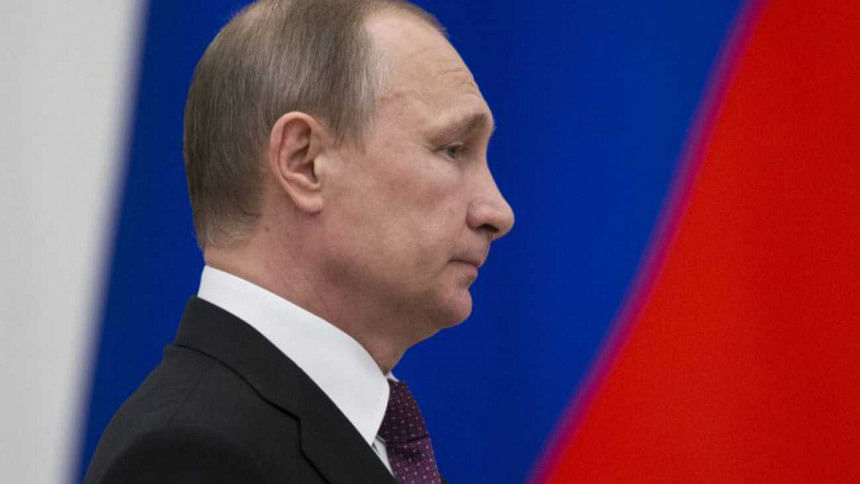Putin in a new light

The centenary of Russia's October Revolution is only months away. The world is keen to witness how Vladimir Putin projects himself and the future of Russia on the once-in-a-century celebrative occasion. The eagerness to understand him has grown in recent times because of his strong-handed role in Eastern Europe and the Middle East. The inquisitiveness about him is all the more pronounced as the controversy over Trump-Putin relations refuses to die down.
"There were, in fact, two revolutions in Russia 100 years ago," reminds Robert Service, a professor of Russian history at St Antony's College, Oxford University. The February Revolution which brought about the downfall of Tsar Nicholas II was never "greatly feted by the Communist administration." It was believed that Nicholas's replacement—a liberal-led provisional government by Alexander Kerensky—"brought absolutely no benefit to working people." So according to Communist dogma, only the October Revolution merited unconditional acclaim, added the eminent professor of Russian history.
Lenin was right that the provisional government under Alexander Kerensky had lost its grip on the country: "And when the Bolsheviks struck, they pushed at a door that was already ajar." Putin, the "supple political gymnast" that he is, continues to resist, so it is claimed, public calls for the closure of the Lenin Mausoleum in Red Square but noticeably avoids praising Lenin.
Indeed, Putin has called on the Russians to respect the memory of Nicholas with "a halo of official esteem descending upon him." Books extol the Tsar's virtues.
In a speech the Russian president gave last year in Stavropol, he blamed Lenin for establishing a federal state structure that made the USSR liable to disintegrate. Though nostalgic about the Soviet era, he gave no credit to Lenin for having founded the USSR. Actually, political pundits had eulogised the Soviet constitution for granting the federating units even the right to cede which served as a cementing rather than a disintegrating factor.
Putin's emphasis is elsewhere. He has declared that the break-up of the USSR was "the greatest geo-political catastrophe of the 20th century."
The official ideology applauded "Russia's greatness as an international power and declared that Russians do well when they live in peace with one another." See the best in tsarist and Soviet Russia and appreciate the continuities in the country's traditions—this seems to be the clarion call of the Russian president.
He is a stickler for internal peace which is considered key to protection of wealth amassed by the ruling class under capitalism. With an inherent stake in stability, he has been ruling the country since 2000—"If his ideology fails to quieten people, he is quick to coerce them."
Russian opposition leader, Alexei Navainy, on December 13, 2016 had announced that he would run for the presidency in 2018. Subsequently found guilty at a retrial in an embezzlement case, he was given a five-year suspended prison sentence. This has thrown his proposed candidature in doubt.
The death of Alexander Litvinenko, a former officer with the Federal Security Service, successor of KGB, was reported in 2006, clouding the relations between London and Moscow.
Vladimir Putin took up the reins of government on the back of adversities followed by a set of favourable circumstances. In the first category fell the throwing in the towel in Afghanistan coupled with a humiliating withdrawal of forces from the country. The break-up of Soviet Union ensured the end of the country's superpower status. The Russian Federation lost its global prestige while enduring a massive economic depression throughout the 1990s.
Predictably, what might be going through Putin's mind is restoring Russia's image from the dishonour it suffered through the Afghan debacle. Thus, in atonement for failure in Afghanistan, Russia is acting tough in the Middle East. Putin believes that the US has barged into countries like Iraq and Libya "which had once been under the Soviet influence."
So he seized the opportunity of ramping up the pro-Assad military system. This happened when Obama and Cameron had made it clear that they were not putting boots on the Syrian ground. By propping up Bashar al-Assad Putin has flagged Russia's "re-emergence as a regional power."
Significantly, on taking over power in 2000, the Russian president was greatly helped by an upturn in the world market price of petro-chemical products. The country's budget got healthier with revenues from oil and gas exports as Moscow's foreign debt burden was considerably lightened.
In this context, Putin could revamp the country's armed forces and modernise its nuclear weapons. In an attempt to fill in the diplomatic vacuum left since Obama's departure he managed to put together a peace conference with Turkey and Iran in the Kazakh capital of Astana. He is set to project Russia as a rising power.
Trump has added an extra USD 54 billion to an already oversized US military budget. Russia and China too have increased their military expenditures. Is the world teetering at the edge of a resumption of Cold War and arms race?
The writer is a commentator on current affairs and former Associate Editor, The Daily Star.

 For all latest news, follow The Daily Star's Google News channel.
For all latest news, follow The Daily Star's Google News channel. 



Comments